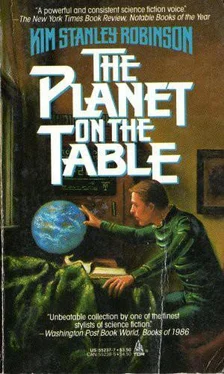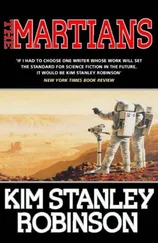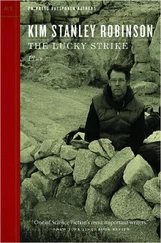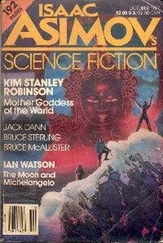“Crazy,” Hook said cheerfully, “you are crazy.” He stepped over him and made his way through the stuff heaped on the floor. He pulled his trombone out of the pile beside his bed.
“Let’s roll,” he said.
“Wait” Crazy cried. He poured some White Brother into cups and passed them around. When Sidney took one he didn’t say a word, just grinned and pointed. Sidney paid him no attention.
We raised our cups in the air. “To the Hot Six,” I said. “Play that thing!” We downed the Brother; I could feel him slide into my stomach and explode there, making my blood pound and my vision jump.
We got our instruments and made our way to the lobby. When we got there we headed for the clerk’s desk, bumping together and shushing each other, trying to calm down some while Hook spoke to the clerk.
“We are the Hot Six,” Hook shouted at the clerk, who stepped back quickly. “And we playing at the Outer Planets Center for the Performing Arts’ W. H. Blakely Memorial Traveling Grant Competition” (we all threw in some “oh yeahs!” for such virtuosity) “and we need your fastest car right now.”
“Well sir,” the clerk said, “all the cars have the same speed capability.”
“Oh come now, come now,” Hook said, “are you telling me that you don’t know of a single car that’s set to go a mite faster than normal?”
“No sir, none except the cars reserved for emergencies—”
“Emergencies! Why, don’t you know that’s exactly what this is? An emergency!”
“An emergency,” we all echoed, and Crazy began to climb over the desk, muttering in a low voice, “Emergency, emergency.”
“If you don’t give us one of them emergency cars,” Hook continued in a lowered voice, “then we’ve come over fifteen hundred million miles for no reason at all.”
The clerk looked past Hook and saw us staring at him with the intensity that the White Brother can give you; looked at Crazy, who was clawing at the buttons on top of the counter. He shrugged. “One of the special cars will be waiting for you at the departure gate.”
“Make it a big one,” Hook said, “we got a lot of stuff to carry.”
We went to the departure gate and found a sixteen-person car, painted bright red, waiting for us. We threw all the instruments in the back and clambered in; Hook set the controls and fired us out into the Titania Gap.
The Gap is a long, straight canyon whose origins are unknown. It looks like it was carved into Titania some eons back by a good-sized rock (say about the size of Demeter) that nearly missed it. It’s about two hundred miles long, four to ten miles wide, and nearly that deep, and almost the entire colony on Titania is set down in the skinny end of it. So when we popped out the wall of our hotel and shot down our track, we were greeted with the sight of the whole colony, covering the floor and climbing the walls of a canyon that would have swallowed most of the rocks we had lived on. There was only the fine lacing of car tracks looping through space to keep us from dropping two or three miles. Above us the swirling greens of Uranus blocked off most of the sky we could see.
“Shit, this thing is fast,” Hook said, after the car had taken a long drop and thrown us back in our seats. Crazy whooped and climbed over the seats back to his tuba case, from which he pulled another milky-white bottle. Fingers cheered and started singing, half-tempo like he always starts, “I Don’t Know Where I’m Going But I’m On My Way,” and Hook joined him.
“I feel pretty good,” Sidney said from his window seat.
I sat back and watched the other cars slide along their strands, listening to the band keep loose. The front line, I thought, would be okay. I had been playing with Hook and Sidney since I was twelve years old—twelve years now—and Hook and Sidney had been playing together longer than that; we were the best front line there was, without a doubt, maybe the best there had ever been. And our back line was almost as good. Washboard never stopped hitting; even now he was clicking out rhythms on the side of the car, metal studs already taped to his fingers. Crazy was unreliable, we’d had to play many times without him because of his wild drinking; he didn’t have the virtuoso command of the tuba that old Clarence Miles, our first tuba man, had had before he was paralyzed; but nobody could pump as much air through a tuba as Crazy could, and his mad stomping and blowing was one of the trademarks of the Hot Six. Fingers—he was probably our weakest spot. He’s a bit slow to understand things, and he only has eight fingers now; maybe the best thing about his playing is that all eight of those fingers hit the keys a good part of the time. That’s the only way a piano man gets heard in a jazz band, especially a fine loud one like ours.
Hook slammed us into one of the track intersections without slowing down, and we dropped through it with a sickening jolt. I had visions of the whole band plummeting down the Gap like a puny imitation of the rock that had carved it.
“Goddammit Hook, what’s the rush?” I asked. “We’re not that late.”
“Don’t worry,” he said. “This is just a fancy ore car here, I got it in hand.”
“Yeah, don’t worry Shaky,” Crazy chipped in. “Why you worrying? You ain’t going to get shaky again, are you Shaky?” They all laughed, Hook hardest of all; he had named me that because I was so scared when I first played with the band that my tone had a vibrato in it.
“I feel real good,” said Sidney.
Then we turned a curve and were pointed right at the Performing Arts Center. It stuck up from the canyon floor like one of the natural spires, a huge stack right at the end of the colony, the last structure before the black U of the Gap stretched out, lightless and empty. The car hit the final swoop of track up to it, and scarcely slowed down. Nobody said anything; Fingers stopped singing. As we drew closer, and the side of the building blocked out our view of the Gap, Hook finished the verse:
“And I got no place to go to
And I got no place to stay
And I don’t know where I’m going
But I’m on my way.”
The waiting room backstage was crowded with a menagerie of about forty brightly dressed performers, all wandering in and out of practice rooms and talking loud, trying to work off tension. As soon as we walked in the door I could feel a heat on my cheeks, on account of all the eyes focusing on us. Everyone was happy to have something to think about besides the upcoming few hours, and as I looked at us all, standing in the doorway gawking, I could see we were good for that. Even in our best clothes (supplied by JM) we looked like exactly what we were: bulky, roughshod, unkempt, maimed, oh, we were miners, clear enough; and under the stares of that rainbow of costumes I suppose we should have quailed. But the energy we got from adrenaline and the White Brother and our wild flight down the Gap gave us a sort of momentum; and when Hook and Crazy looked at each other and burst out laughing. it was them that quailed. Glances turned away from us, and we strode into the room feeling on top of things.
I walked over to a circle of chairs that was empty and sat down. I got my trumpet out of its case and stuck my very shallowest mouthpiece into it; hit ‘em high and hard, I thought. The rest of the band was doing the same around me, talking in mutters and laughing every time their eyes met. I looked around and saw that now our fellow performers were trying to watch us without looking. As my gaze swept the room it pushed eyes down and away like magic. When Washboard pulled his washboard out of his box and compulsively rippled his studded fingers down the slats to pop the cowbell, there was an attentive, amazed silence—very undeserved, I thought, considering how strange some of the other instruments in the room appeared—if that was really what they were, I walked over to the piano in a corner of the room, and nearly fell at an unexpected step down. I hit B-flat. My C was in tune with it. Hook, Sidney, and Crazy hit a variety of thirds and fifths, intending to sound as haphazard and out of tune as possible. Sidney made a series of small adjustments to his clarinet, but Hook and Crazy laid their brass down, the better to observe the show going on around them. Washboard was already moving around the room, stepping from level to level and politely asking questions about the weird machinery.
Читать дальше












